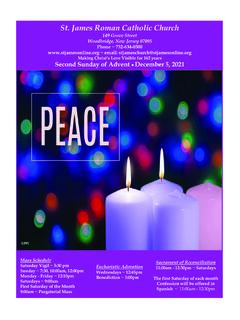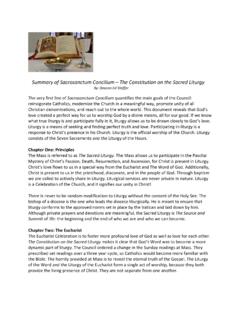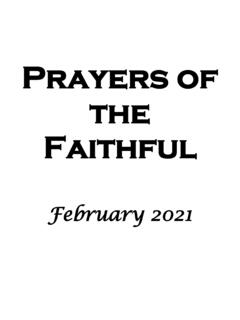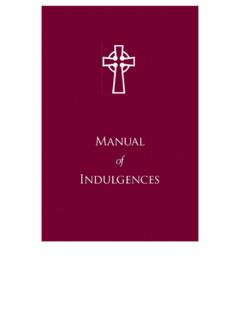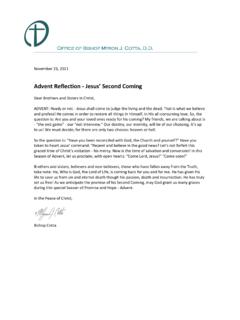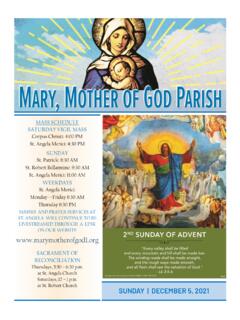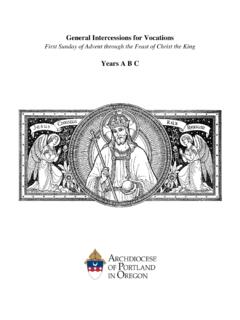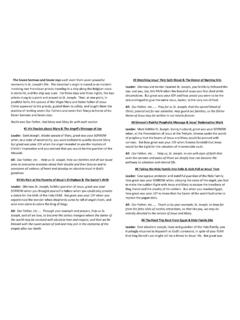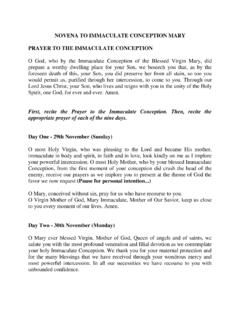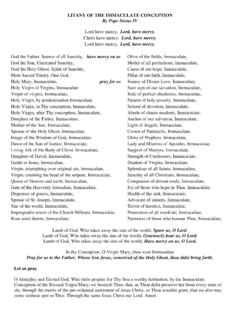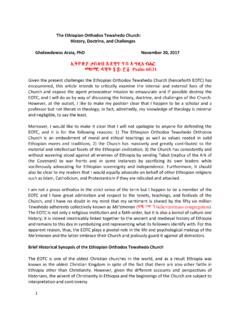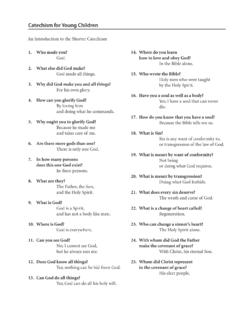Transcription of Glossary Catechism of the Catholic Church
1 Glossary from the Catechism of the Catholic Church Even before the promulgation of the Catechism of the Catholic Church , a Glossary had been proposed to provide assistance to those who would use the new Catechism . This Glossary has been prepared by Archbishop William J. Levada, who served as a member of the Editorial Committee of the Special Commission of the Holy See for the Catechism of the Catholic Church . It has been reviewed by the NCCB ad hoc Committee to Oversee the Use of the Catechism , as well as by the chairman and staff of the NCCB Committee on Doctrine. This Glossary has been composed with reference to the language of the Catechism itself: the numbers in parentheses refer to the number(s) in the Catechism where the term or concept is explained. The criterion for the selection of words included in this Glossary is twofold: (1) unfamiliar or technical terms are defined, in order to assist readers who are not acquainted with them through formal religious or theological studies; and (2) multiple meanings or uses of familiar terms are presented, thus alerting readers to the various uses of the term in Church doctrine.
2 Common words and most proper names are not listed in this Glossary , nor are religious terms which are not directly or indirectly present in the Catechism . It is important to remember that this Glossary , like the Catechism 's Indexes, is an additional instrument by which readers may find assistance in their use of the Catechism itself. While the Glossary is faithful to the language of the Catechism , it does not participate in the approval of the text of the Catechism given in the Apostolic Constitution Fidei depositum of Pope John Paul II. -A- ABORTION: Deliberate termination of pregnancy by killing the unborn child. Such direct abortion, willed either as an end or a means, is gravely contrary to the moral law. The Church attaches the canonical penalty of excommunication to this crime against human life (2271-2272). ABRAHAM: The man of faith and patriarch of Israel with whom God made a covenant which promised him land in which to live and many descendants, a great people for whom the Lord would be their God.
3 Through Abraham God formed the people to whom he would later give the law by revelation to Moses. With the advent of Christ, the people of Israel would serve as the root to which the Gentiles would be grafted by their coming to believe (59, 72, 145, 705, 762, 2570). ABSOLUTION: An essential element of the Sacrament of Penance in which the priest, by the power entrusted to the Church by Christ, pardons the sin(s) of the penitent (1424, 1442, 1449, 1453, 1480). ACEDIA: A less common synonym for sloth, one of the seven "capital" sins (1866). See Sloth. ACOLYTE: A liturgical minister appointed to assist at liturgical celebrations. Priests and deacons receive this ministry before they are ordained. Lay men may be installed permanently in the ministry of acolyte through a rite of institution and blessing (903, 1672). ADAM: According to the creation story in Genesis, the first man. From this story the Church has learned that humanity was originally created in a state of holiness and justice and that the first ancestors of the human race lost this state for themselves and all humanity by their sin ("original sin").
4 Christ is called the "second" or "new Adam" because he ushered in the new creation by forgiving sin and restoring humanity to the grace of God's friendship lost by original sin (359, 375, 388, 390, 402-404, 504; cf. 635, 655). ADORATION: The acknowledgment of God as God, Creator and Savior, the Lord and Master of everything that exists. Through worship and prayer, the Church and individual persons give to God the adoration which is the first act of the virtue of religion. The first commandment of the law obliges us to adore God (2096, 2628; cf. 1083). ADULTERY: Marital infidelity, or sexual relations between two partners, at least one of whom is married to another party. The sixth commandment and the New Testament forbid adultery absolutely (2380; cf. 1650). ADVENT: The liturgical season of four weeks devoted to preparation for the coming of Christ at Christmas (524). ALMSGIVING: Money or goods given to the poor as an act of penance or fraternal charity.
5 Almsgiving, together with prayer and fasting, are traditionally recommended to foster the state of interior penance (1434; cf. 1969, 2447). ALTAR: The center and focal point of a Church , where the sacrifice of Christ on the cross is made present under sacramental signs in the Mass. Among the Israelites the altar was the place where sacrifices were offered to God. The Christian altar represents two aspects of the mystery of the Eucharist, as the altar of sacrifice where Christ as the sacrificial victim offers himself for our sins and as the table of the Lord where Christ gives himself to us as food from heaven (1182, 1383). AMEN: A Hebrew word meaning "truly; it is so; let it be done," signifying agreement with what has been said. The prayers of the New Testament and of the Church 's liturgy, and the Creeds, conclude with "amen." Jesus used the word to introduce solemn assertions, to emphasize their trustworthiness and authority (1061, 1345, 1396, 2856, 2865).
6 ANALOGY OF FAITH: The coherence of the truths of the faith among themselves and within the whole plan of Revelation (114). ANAMNESIS: The "remembrance" of God's saving deeds in history in the liturgical action of the Church , which inspires thanksgiving and praise (1103). Every Eucharistic Prayer contains an anamnesis or memorial in which the Church calls to mind the Passion, Resurrection, and glorious return of Christ Jesus (1354, 1362). ANAPHORA: The Eucharistic Prayer--the prayer of thanksgiving and consecration--which is the heart and summit of the celebration of the Mass (1352). ANGEL: A spiritual, personal, and immortal creature, with intelligence and free will, who glorifies God without ceasing and who serves God as a messenger of his saving plan (329-331). See Guardian Angels. ANGER: An emotion which is not in itself wrong, but which, when it is not controlled by reason or hardens into resentment and hate, becomes one of the seven capital sins.
7 Christ taught that anger is an offense against the fifth commandment (1765, 1866, 2262). ANNUNCIATION: The visit of the angel Gabriel to the virgin Mary to inform her that she was to be the mother of the Savior. After giving her consent to God's word, Mary became the mother of Jesus by the power of the Holy Spirit (484, 494). ANOINTING: A symbol of the Holy Spirit, whose "anointing" of Jesus as Messiah fulfilled the prophecies of the Old Testament. Christ (in Hebrew Messiah) means the one "anointed" by the Holy Spirit. Anointing is the sacramental sign of Confirmation, called Chrismation in the Churches of the East. Anointings form part of the liturgical rites of the catechumenate, and of the Sacraments of Baptism and Holy Orders (695). See Christ. ANOINTING OF THE SICK: One of the seven sacraments, also known as the "sacrament of the dying," administered by a priest to a baptized person who begins to be in danger of death because of illness or old age, through prayer and the anointing of the body with the oil of the sick.
8 The proper effects of the sacrament include a special grace of healing and comfort to the Christian who is suffering the infirmities of serious illness or old age, and the forgiving of the person's sins (1499, 1520, 1523, 1526-1532). ANTICHRIST: The "deceitful one" referred to in the New Testament, associated with the "mystery of iniquity" which will precede the second coming of Christ, through which people will be led away from the truth to follow a false "messianism," by which man glorifies himself and human achievement in place of God and his Messiah come in the flesh, in whom the kingdom will be fulfilled (675-677). APOSTASY: The total repudiation of the Christian faith (2089; cf. 817). APOSTLE: A term meaning one who is sent as Jesus was sent by the Father, and as he sent his chosen disciples to preach the Gospel to the whole world. He called the Twelve to become his Apostles, chosen witnesses of his Resurrection and the foundation on which the Church is built (857).
9 The apostolic office is permanent in the Church , in order to ensure that the divine mission entrusted to the Apostles by Jesus will continue to the end of time. The bishops receive their office as successors of the Apostles through the Sacrament of Holy Orders (860). See Apostolic Succession. APOSTLES' CREED: A statement of Christian faith developed from the baptismal creed or "symbol" of the ancient Church of Rome, the see of St. Peter, first of the Apostles. The Apostles' Creed is considered to be a faithful summary of the faith of the Apostles (194). APOSTOLATE: The activity of the Christian which fulfills the apostolic nature of the whole Church by working to extend the reign of Christ to the entire world (863). APOSTOLIC SUCCESSION: The handing on of apostolic preaching and authority from the Apostles to their successors the bishops through the laying on of hands, as a permanent office in the Church (77, 861).
10 APPARITION: An appearance to people on earth of a heavenly being--Christ, Mary, an angel, or a saint. The apparitions of Jesus in his risen body to his disciples occurred between Easter and his Ascension into heaven (641, 659). ASCENSION: The entry of Jesus' humanity into divine glory in God's heavenly domain, forty days after his Resurrection (659, 665). ASCESIS: The practice of penance, mortification, and self-denial to promote greater self-mastery and to foster the way of perfection by embracing the way of the cross (2015). ASSUMPTION: The dogma which recognizes the Blessed Virgin Mary's singular participation in her Son's Resurrection by which she was taken up body and soul into heavenly glory, when the course of her earthly life was finished (966). ATHEISM: The denial in theory and/or practice that God exists. Atheism is a sin against the virtue of religion required by the first commandment of the law (2124-2125).
